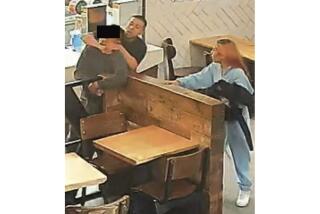Man who was brought to the U.S. on a murder charge now is in immigration limbo

Juan Jesus Flores, shown in La Jolla, was extradited from Mexico this year to stand trial in a 1983 slaying in Beverly Hills. He was found not guilty.
Juan Jesus Flores had been headed to breakfast in Tijuana when a group of armed men surrounded his car.
He was sure he was about to become another kidnap victim.
To his relief, Interpol agents were there to arrest him on suspicion of murder.
After about three years in a Mexican prison, he was extradited last summer to face trial in Beverly Hills.
Today the 67-year old finds himself something of a legal oddity: The U.S. government brought him here to face murder charges. A jury acquitted him. But it turns out there is no process for making sure he goes back to Mexico.
The legal process Flores went through — from international fugitive to extradited criminal defendant to a free man — essentially turned him into a legal immigrant.
Flores would like to remain in the United States.
The story began on Easter Sunday 1983.
Flores met his estranged wife and their toddler, Cristina, for a picnic at Roxbury Park. He planned to whisk the little girl away.
In 2015, that would be considered kidnapping. But the fact that Flores and the girl’s mother weren’t divorced and didn’t have a custody agreement at the time meant it wasn’t a crime.
According to court transcripts, his now-ex-wife, Jean, was suspicious. She enlisted two male friends to wait close by in case Flores tried to take Cristina.
At some point during the picnic, Flores told his wife he was going to get his jacket and carried their daughter toward his Mercedes. When she lost sight of them, Jean Flores screamed.
Her friend Robert Garver, wearing military-style boots and camouflage clothing, rushed at Flores, pounding on the driver’s side window and kicking the door. Another friend, David Berry, pulled up in a van and tried to block Flores.
Garver jumped onto the hood of the Mercedes and Flores sped backward, according to court records.
Flores yanked the steering wheel hard and slammed on the brakes, sending Garver off the hood. He managed to grab onto the side mirror, but when Flores drove past a parked car, Garver was crushed against it.
Berry, who had been following in the van, stopped to help his friend as Flores drove away.
That night, Flores hired a lawyer and turned himself in to police. He was booked on suspicion of assault with a deadly weapon but was released on bail.
Garver died at a hospital several days later.
Flores left the country and became a fugitive.
More than 20 years later, Flores’ ex-wife, now named Jean Simon, received a visit from one of Flores’ other daughters. This prompted her to reach out to investigators at the Beverly Hills Police Department, according to police records and interviews.
“These are the three current numbers for Juan,” Simon told Beverly Hills police Sgt. Mike Hernandez. “One’s a cellphone. One’s his clinic and one’s some other place I don’t know.”
Flores and family members said that he had suffered from post-traumatic stress as a result of the tragedy involving Garver and that relatives insisted he get psychiatric treatment in Mexico.
Once he got out of treatment in 1989, Flores began a new life in Tijuana. He studied to become a psychiatrist, remarried and had three more daughters, Simon said. She told police that she had maintained contact with him for their daughter’s sake.
Simon and Flores had met in the late 1970s, when his first wife was being treated for leukemia. They began dating after she died.
“He was the kind you couldn’t get away from,” she told police. “I was living with somebody else. He sent me flowers to my house, pursued me, ended up climbing through my window.
“He comes across as so nice and so sweet and so innocent. When you talk to him he’s pulling tears.... It’s always manipulation.”
After the interview with Simon ended, Hernandez reviewed the case file. The prosecutor who presented the evidence to a judge back in 1983 had been thorough in covering every detail of Garver’s death. Getting an extradition order shouldn’t be too daunting, Hernandez said.
Still, it would be eight years before Flores was caught.
The Los Angeles County district attorney’s office announced his extradition in June, with the trial just months away.
MORE: Get our best stories in your Facebook feed >>
Flores’ attorney successfully argued against allowing a lesser charge of manslaughter to be considered. When the trial began Sept. 14, Flores faced one charge: Murder.
He took the stand, telling jurors that he had been trying to get away from unknown attackers that morning in 1983. He hadn’t intended to kill anyone.
The panel was persuaded.
“He just seemed like a nice man,” juror Trish Ellebracht said. “He said [the words] ‘fear’ and ‘afraid’ so many times on the stand.”
On Sept. 18, Flores was found not guilty. The next day he changed out of his jail jumpsuit, put on street clothes and stepped out of the Twin Towers Correctional Facility in downtown Los Angeles.
But he had no paperwork showing how he had entered the United States.
Federal officials and immigration law experts said Flores’ situation was virtually unheard of: He entered the country as a criminal defendant but has no visa or documentation to stay here.
A recent mandate by the U.S. Immigration and Customs Enforcement agency states that prisoners with no violent criminal record or egregious felony convictions are not priorities for deportation. That means Flores is unlikely to be taken into custody and sent out of the country.
“My heart is divided in two,” he said recently. “Here my first wife is buried.”
Flores is staying with relatives in San Diego County. Monique Flores, his eldest daughter, who is a real estate agent in Tennessee, said the family has hired an immigration attorney to help see them through the visa or permanent residency application process. They just need proof that her dad entered the country legally.
Flores said he would go back to Mexico if that’s what the process requires. He doesn’t blame authorities for taking him into custody.
“I do not want any revenge.... I don’t want to sue anybody,” he said. “I wouldn’t want anyone to live that experience anymore.”
Twitter: @JosephSerna
ALSO
These California lawmakers don’t live in the districts they represent
Judge rules sexual orientation discrimination falls under purview of landmark Title IX law
How a battery recycler contaminated L.A.-area homes for decades
More to Read
Sign up for Essential California
The most important California stories and recommendations in your inbox every morning.
You may occasionally receive promotional content from the Los Angeles Times.











